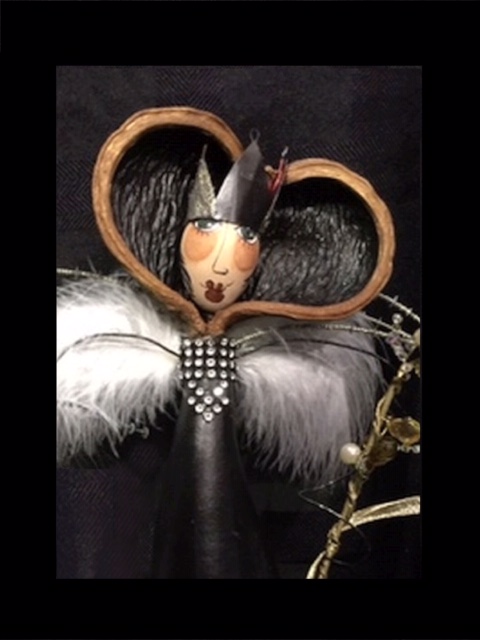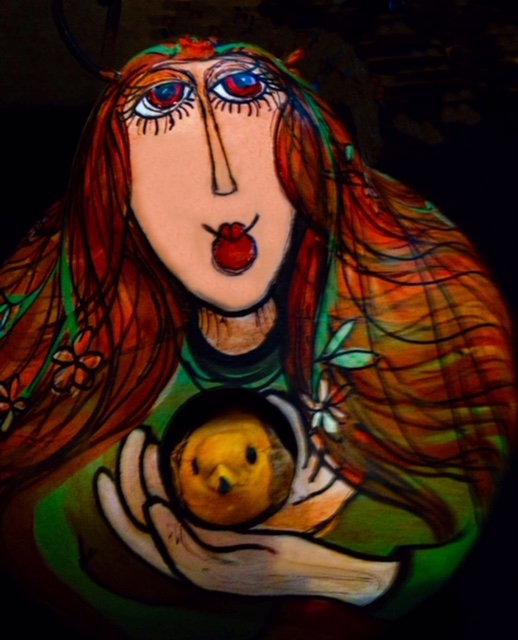
by Sandi Sweeney
Poet’s Statement
In “Poetry is not a Luxury,” Audre Lorde triumphs poetry’s role in the creation of a future defined by the liberation of all humanity. The foundational change that must take place for this future to exist begins at the level of the very language used to describe it. These six poems (and a seventh, “to the roadkill cat,” published in Verse of April, 2019) are odes to Lorde, to Hélène Cixious who questioned the presence of the patriarchy in language (the words we have and the words we don’t have), to Gertrude Stein who divorced the referent from the sign, and to Joan of Arc qui n’a pas brûlé. Furthermore, these poems concern themselves with the ways new language can restore meaning to our lives, which have become clichés of both production and fear of the differences that form our fierce and secret strength. In the U.S. as I type this, we are rioting in the streets for racial justice while the Senate and president conspire to repeal our hard-earned rights to control our bodies and marry the people we love. There is an opportunity here to create a better world, and it is the place of the poet—indeed, the artist—to sketch what that world would look like. As Lorde puts it, “Poetry is not only a dream and vision; it is the skeleton architecture of our lives. It lays the foundations for a future of change, a bridge across our fears of what has never been before.”
this is what a feminist looks like
how many clandestine
wheelhouses
and a clump of forgetting?
the why of the matter
the undulating
why of the matter—
unbeknownst
leaking
horseradish ribs
bleed getting
into the lusty
afternoon
a fragrance
of apple blossom
processed
against bullshit
a question
is a lack
of garden space
a misty pretension grows
in the wooden tomorrow
but how many
how many strong
from the pig-collapse
the meaty
nightmare? and the grass
clipped short?
unbreaking is a cavity
a sense is
not showing
yesterday’s dishes yet
a sense
is accumulating
a rain shower
beat beat speckled stone
the dream of a cliff-tomb
the longed-for bed
why is a forest
an ungainly accident
& a disengagement?
the peopling—
a shit show of flourishing
watermarks
it is egregious
(to expose a curtain & a pretty frill)
that we are all
adrift at once
untouchable and together
is no accident
will any version
of enough be lucky
if the Temple door
is barred?
we don’t need you to
(someone else always will)
maybe you need you to
it is good & right to feel it—
capital T the Thing
catcher in the rye
they do not even know
the mark of wealth
is on the face or green
on the inner thigh
unbearable dimensions
ungate the marginal
& when the borders dissolve
they expand into the night
who marks their going
that is so unlike my going
(is it like yours?)
the future is gainly
but I tell them how a rose
is rarely a rose
never was a rose
and never will be
what good is a rose
or the absence of a rose
when they leave here
clandestine, radiant?
a regalia exits
the white chorus creating
an epistemology of sound—
what is doled here
will be doled again
I wrap them
in this weighted blanket
like a hair shirt
reach my arms out to the dark

by Sandi Sweeney
the witch trial
under the
absolutely-tank
a crystal clear
knowing
a tomorrow is a molten thing
a Thing thing
the crooked chandelier and a forgery of arrows
the black crow and the nine
the lackey unmans
the afternoon pleasantly until
a languid arrangement of teacups
can be reprimanded
an understated presumption
of pumpkin-spice perhaps
a contingency towards showing
an ungetting—
an ungetting in the snow
a post-apocalism
this burial ground my body
my white female body—
shadow figure
voice and offspring of oppression
where does my body begin and
where does the performance end?
words (flutters and thumps)
generate figures and symbols
that make and take
meaning from human places
- the house on the hill
a colonial
shutters banging in the wind - the witch’s cave
its broken birds, her stake - and the basement/attic
head and tail of a self-consuming snake
no holy oil, smoke, or water
can smudge the gallows within
the DNA our bodies build
and die on everyday
if thy right eye offends…
oh when our stain is scorched
from this earth / this earth
also scorched
Jehanne me tutoie
that one great
something
exists is impossible
(did you want for a moment
one great something?)
1. to begin
b. is cyclical
rest but no ending
unburn unburn unburn
and to give birth
is not the same flowers
what was not consumed—
there is a great peace
when words crumble
2. in springtime
b. not the same flowers
c. the stake
but you they say
unshackled
continue to wage war
Maia Elgin is currently isolating in a creaky old house in the Mississippi Delta with her partner and their animal family. Her chapbook The Jennifer was published by Birds of Lace, her poems are in recent journals including Honey & Lime, Delta Poetry Review, and Cordella, and she’s been featured in Tarpaulin Sky, Verse of April, and Rhythm & Bones’ YANYR Anthology. She’s an Assistant Professor at Delta State University with an MFA from LSU.
Sandi Sweeney is a mixed media artist and crafter. Her love of nature provides the inspiration for the pieces she creates and her approach is eclectic and whimsical. She enjoys taking pieces of nature and transforming them into unique pieces of art.